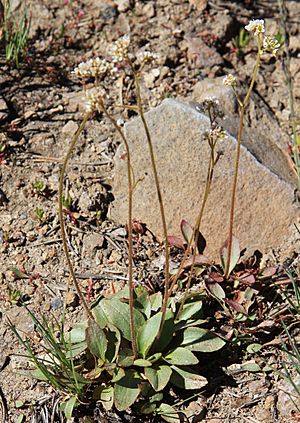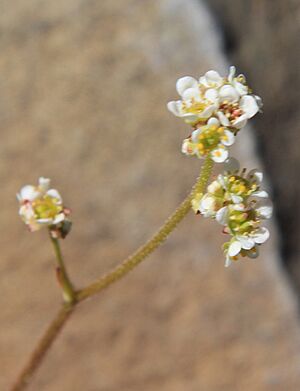Sierra saxifrage facts for kids
Quick facts for kids Sierra saxifrage |
|
|---|---|
 |
|
| Scientific classification |
|
| Kingdom: | Plantae |
| Clade: | Tracheophytes |
| Clade: | Angiosperms |
| Clade: | Eudicots |
| Order: | Saxifragales |
| Family: | Saxifragaceae |
| Genus: | Micranthes |
| Species: |
M. aprica
|
| Binomial name | |
| Micranthes aprica (Greene) Small
|
|
| Script error: The function "autoWithCaption" does not exist. | |
Script error: No such module "Check for conflicting parameters".
The Micranthes aprica, often called the Sierra saxifrage, is a small but tough flowering plant. It is known for living in very high, cold mountains. This plant is a type of herb that comes back year after year.
You can find the Sierra saxifrage in the tall mountains of California. This includes the famous Sierra Nevada and the southern Cascade Range. It also grows on nearby slopes in southern Oregon and western Nevada.
Contents
Where the Sierra Saxifrage Lives
High Mountain Homes
The Sierra saxifrage loves mountain areas. It grows in places with an alpine climate. This means it lives where it is very cold, like high up on mountains.
Favorite Spots
You can often spot this plant in mountain meadows. It also likes to grow next to streams. These streams are often fed by melting snow. The plant needs these wet spots to survive in its harsh home.
How the Sierra Saxifrage Survives
Resting to Save Water
This plant is a perennial herb. This means it lives for more than two years. For much of the year, it stays in a dormant state. Being dormant is like taking a long nap. It helps the plant save water and energy. Because of this, it does not flower very often.
Leaves and Stems
The Sierra saxifrage has small leaves. They are gray-green and shaped like an oval. The edges of the leaves are slightly toothed. These leaves grow in a flat circle close to the ground. This circle is called a basal rosette. Each leaf can grow up to about 4 centimeters long.
Flowers of the Sierra Saxifrage
When It Blooms
When the Sierra saxifrage does bloom, it is a special sight. It sends up a straight stem called a peduncle. This stem can be several centimeters tall. On top of this stem, a cluster of small flowers appears.
Flower Parts
Each flower is small and delicate. It has five sepals. Sepals are like small leaves that protect the flower bud. It also has five tiny white petals. In the very center of the flower, there is a bunch of whiskery stamens. Stamens are the parts that make pollen.
 | Laphonza Butler |
 | Daisy Bates |
 | Elizabeth Piper Ensley |


